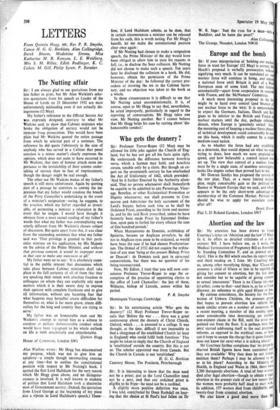The Nutting affair
LETTERS
From Quintin Hogg, MP, Rev P. R. Smythe, Canon H. G. G. Herklots, Alan Collingridge, Derek Bloom, Madeleine Simms, Miss Katharine M. R. Kenyon, L. E. Weidberg, Mrs S. M. Raley, Edith Rudlinger, K. C. Cohen, M. Gill, Philip Syrett, P. Baratier.
Sir: 1 am always glad to see quotations from my late father in print, but Mr Alan Watkins's selec- tive quotations from his speech as Leader of the House of Lords on 21 December 1932 are most unfortunately misleading even if not actually dis- ingenuous (12 May).
My father's reference to the Official Secrets Act was expressly designed, contrary to what Mr Watkins said, to show that Cabinet ministers who broke the obligation of secrecy would not be immune from prosecution. This would have been plain had Mr Watkins quoted the entire passage from which he selected part of a sentence. The reference he did quote ('obviously in the case of anybody who has served in a Cabinet that penal sanction is a minor matter') clearly expresses the opinion, which does not seem to have occurred to Mr Watkins, that men of honour attach more im- portance to the inviolability of their solemn under- taking of secrecy than to fear of imprisonment, though the danger might be real enough.
The other use Mr Watkins makes of my father's speech is still more unfortunate. Again by quoting part of a passage he contrives to convey the im- pression that my father would condone the breech of the Privy Councillor's undertaking in the event of a minister's resignation—owing, he suggests, to the practice, which my father regarded as invari- able, of permitting a minister a relaxation in the event that he resigns. I would have thought it obvious from a most casual reading of my father's words that what my father was contemplating was utterly different from Mr Watkins's chosen subject of discussion. But quite apart from this, it was clear from the succeeding sentences that what my father said was 'That privilege is granted to that parti- cular minister on his application, by His Majesty on the advice of the Prime Minister, and without that previous consent, it would be improper even in that case to make any statement at all.'
My father went on to say: 'It is absolutely essen- tial in the public interest that discussions which take place between Cabinet ministers shall take place in the full certainty of all of them that they are speaking their minds with absolute freedom to colleagues on whom they can explicitly rely upon matters which it is their sworn duty to express their opinion with complete frankness and to give all information, without any haunting fear that what happens may hereafter create difficulties for themselves or, what is far more grave, create diffi- culties for the king and country they are trying to serve.'
My father was an honourable man and Mr Watkins's attempt to recruit him as a witness to condone or palliate dishonourable conduct which would have been repugnant to his whole outlook on life is both unscholarly and objectionable. Quintin Hogg House of Commons, London SWI
Alan Watkins writes: Mr Hogg has misconceived my purpose, which was not to give him an apoplexy—a simple though unrewarding exercise at any time—but to outline the constitutional position with respect to Mr Nutting's book. I quoted the first Lord Hailsham for the very reason which Mr Hogg gives above, and no disingenu- ousness is involved. It is well known to students of politics that Lord Hailsham took a' dracbnian view of Government secrecy. (Indeed, the quotation from Lloyd George at the beginning of my piece was a riposte to Lord Hai'sham's speech.) There-
fore, if Lord Hailsham admits, as he does, that in certain circumstances a minister can be released from his oath, this is worth noting. For Mr Hogg's benefit, let me make the constitutional position clear once again: If Mr Nutting had chosen to make a resignation speech, the Prime Minister of the day would have been obliged to allow him to state his reasons in full, i.e., to disclose the Suez collusion. Mr Nutting did not choose to make such a speech. Ten years later he disclosed the collusion in a book. He did, however, obtain the permission of the Prime Minister of the day: he followed the correct pro- cedure of showing the Nis to the Cabinet Secre- tary, and no objection was taken to the book as a whole.
In these circumstances it is difficult to see that Mr Nutting acted unconstitutionally. It is, of course, open to Mr Hogg to say that, nevertheless, he acted improperly, particularly in regard to the reporting of conversations. Mr Hogg takes one view, Mr Nutting another. But I cannot believe that Mr Hogg helps his case by ranting about 'dis- honourable conduct.'


































 Previous page
Previous page